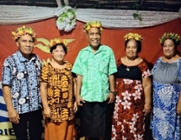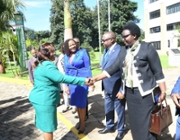2020 marked two significant milestones in achieving the vision of equal rights and equal opportunities for all women in the world: the 25th anniversary of the adoption of the Beijing Declaration and Platform for Action; and the 20th anniversary of the adoption of UNSCR 1325 on Women, Peace and Security. But the vision is far from being realised. The UN Department of Economic and Social Affairs (DESA) reported, in the same year, that in spite of improvements, the goal to achieve full gender equality - SDG 5 - remains unreached. Many challenges such as the continued underrepresentation of women at all levels of political leadership has not been fully addressed.
In April 2020, UN Secretary-General, Antonio Guterres warned that limited gains in gender equality and women’s rights made over the decades are in danger of being rolled back due to the COVID-19 and urged governments to put women and girls at the centre of recovery efforts. Undeniably, the crisis has laid bare and exacerbated existing inequalities for women and girls globally across every aspect - health, economy, social protection, security and leadership.
Entrenched power imbalances
Gender inequalities rooted in structural and well-entrenched power imbalances reinforce patterns of disempowerment and different types of exclusion and marginalisation of women. A person’s intersecting and overlapping social and political identities – including, but not limited to gender, caste, race, sexuality, religion, disability, physical appearance, citizenship - create different modes of discrimination and privilege. Women who are older, indigenous, belonging to a lower or lowest caste, living with disability, illiterate, earning low income, LGBT+, racialised, new and aspiring and an immigrant navigate a more difficult terrain in seeking political office for the first time or staying in office.
It is imperative, more than at any other time, to address existing inequalities and contribute more robustly to transforming women’s political advancement and leadership. One of the ways that is gaining traction in engendering more active participation of women in political life is mentoring.
In support of SDG5, the Commonwealth Local Government Forum (CLGF) with its Commonwealth Women in Local Government Network and Platforma, commissioned me to undertake a review of mentoring programmes for women’s political advancement and leadership. A Review of Mentoring Programmes for Women’s Political Advancement and Leadership offers a snapshot of multiple mentoring experiences and good practices of mentoring programmes in six countries - Canada, Dominica, India, Trinidad and Tobago, Uganda and the UK- and two regions - the Basque country and the Pacific, in particular large ocean nations.
Transformative Mentoring: Why It Works
“Mentoring is guidance to self-identity, self care…. Transformative mentoring is about building community and solidarity. It is important for mentors to walk the talk…. (and) both mentors and mentees to agree on the parameters.”
Hazel Brown, Mentor, Coordinator, Network of NGOs for the Advancement of Women, Trinidad and Tobago, the Caribbean.
Beyond the traditional view of mentoring is a transformative model that involves establishing learning alliances and a commitment to personal and professional growth; social, organisational and political change. Transformative feminist mentorship is a long-term process that builds reciprocal relationships of solidarity, mutual learning and support; acknowledging that learning is a continuous journey involving building trust, sustaining connectedness and facilitating dialogues, intergenerational conversations and unlearning. It is also about enabling mentees to journey at their pace and to navigate difficult spaces.
Some highlights of the review
"Mentoring is a symbiotic relationship that is about building each other, nurturing mutual trust and expanding networks. Both mentor and mentee must invest in the relationship.”
Hon. Flavia Kalule, MP Elect, 11th Parliament of Uganda, Kasanda Dictrict,Uganda, Africa
What principles and factors facilitate successful mentoring?
Mutual learning and trust
Mentoring is a symbiotic learning relationship. Both mentor and mentee must mutually invest in the relationship for it to work and recognise that the process is iterative. Building and cultivating trust is foundational. Based on the interviews, the facilitating factors for cultivating a trusting relationship are: open and honest communications and respect for one’s own and the other person’s dignity. Truth telling is vital and risking vulnerability underpins trust-building. The willingness to share one’s personal journey encourages women to build from each other’s experiences. And as one takes risks, the principle of confidentiality is critical in building trust.`
Accompaniment and solidarity: It’s not hit and run
Transformative mentoring is less about a “contract” more than it is about engendering solidarity and amplifying voice. Successful mentoring supports mentees to access spaces for engagement and to tell one’s story. It is a kind of accompaniment that encourages belongingness and an exploration of “new” or alternative paradigms. Accompaniment requires commitment to a long-term process and personalised support. This kind of mentoring inspires women and builds in them not only confidence but courage to break patterns, challenge patriarchal mindsets, disrupt the status quo and power imbalances and face what can be both a rewarding and challenging journey.
"Supporting our new colleagues in their first steps in their new positions in the municipalities, in a personalized way and from accumulated experience, is the bridge that unites individual and collective empowerment."
Virginia Woolf Basqueskola, Basque Country, Spain, EU
One size does not fit all: intersectionality and specificity
Contextual specificity is fundamental in designing and undertaking a mentoring programme. It is an important principle to be mindful of the cultural nuances, gender and its intersectionality and to harness ownership by the mentee. For example, the pace of the mentoring process must be in step with that of the mentee’s political journey with clear goals and accountability. What does mentoring look like for young urban women as opposed to women in grassroots communities? What about mentoring in the context of indigenous peoples and communities?
What are the methodologies and approaches that work?
Face-to-face, one-to-one mentoring has proven to work best. This methodology is most conducive to establishing a relationship of trust, which requires a personal approach, built over time. There is no substitute for face-to-face and one-to-one mentoring.
Other ways of knowing and learning that have worked go beyond desk conversations. This includes learning by doing, peer to peer mentoring and collaborative learning. Mentees benefit a lot from mentors who take them in campaign trails, give them a seat to observe actual legislative or executive meetings, share opportunities for shadowing and allow them to speak and be recognised in public engagements. Exposure and visibility are important and can address economic disadvantage of women
“Speak the truth always… What worked well for me is the privilege of being a trustworthy advisor or friend… The important ingredient in nurturing a mentor-mentee relationship is the gift of listening.”
Vernice Bellony, Mentor, Councillor- Vieille Case Council, Dominica, the Caribbean
On the other hand, trainings and formal courses are often entry points for establishing mentoring relationships or complement existing mentorships. But informal and organic mentoring relationships may take place without necessarily a companion formal training course. The consensus established by the review points to the effectiveness of the informal nature of mentoring, particularly those that are face-to-face, one-to-one and personal.
Apart from one-to-one sessions, collaborative group learning has facilitated both skills training and confidence building. Bringing together mentees - from three to five women - and their mentor (if it’s common) or respective mentors to share their experiences and tackle a project has proven to be beneficial. Good practices in India and Uganda harnessed collaborative way of learning that promote co-creation of solutions and have led to women organising alliances and networks.
“When the village woman understands that she is part of a larger network she becomes more confident and courageous.”
Ratnamala Vaidya, Panchayat Sakhi (Local Mentor), Panchayat: Manegaon Bazzar (Block and District Bhandara), India, Asia
The COVID-19 crisis has compelled the world to resort to a 'technology driven, no touch future'. Undeniably, technology has worked as an enabler of dialogue, information sharing and learning. Be that as it may, the prevailing inequity in access to technology and the intergenerational dimension in the use of digital technology are considerations in designing mentoring programmes. It was also argued that technology is never able to replace face to face, culturally situated interactions.
What can be done differently?
“It is not about being perfect… what is key is collaboration, truth telling, shadowing-taking mentees to events and conferences - and reaching out to connect and build a strong community of women and allies among male politicians. (What would I do differently?) I would spend more time (with the person) before formalising the mentoring relationship.”
Bev Esslinger, Councillor, Ward 2, City of Edmonton, Alberta, Canada, North America
Short-term mentoring arrangements do not work. When the process is abbreviated and 'projectised', the chances of success are minimal. Mentoring relationships that are personalised and based on mutual commitment to learn have proven to grow over time. Investing in having the right match is critical. Balance between a structured matching criteria and a responsive matching process that takes into account values, personality, expertise and goals have proven to work better.
Formalising and sustaining a mentoring programme requires dedicated resources and a robust support system of technical secretariat, allies and partners.
Embarking on, and staying on course in a political journey can be challenging. The issue of trauma, its embodied nature, and the importance of addressing it were raised in the course of the review. It was suggested that, whether women lose or win, they need support to process what they have gone through. Mentors should not be expected to undertake counselling sessions, but may be in a position to organise a meeting with a certified counsellor to speak to the issue of trauma as part of the mentorship.
The impacts of the multiple crises we face are never gender neutral. Mentoring is an integral piece of the puzzle that can help women rise above converging challenges and enable the much-needed advancement of women’s leadership in politics, however iteratively and incrementally.
CLGF launched its Month of Mentoring Campaign on 1 August 2021. #ComWLG
[i] The pan-European coalition of towns and regions and their national, EU and global associations






